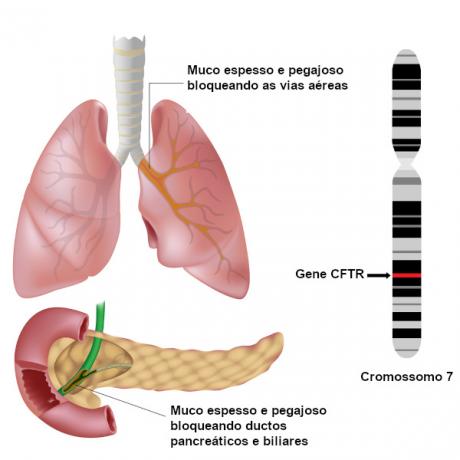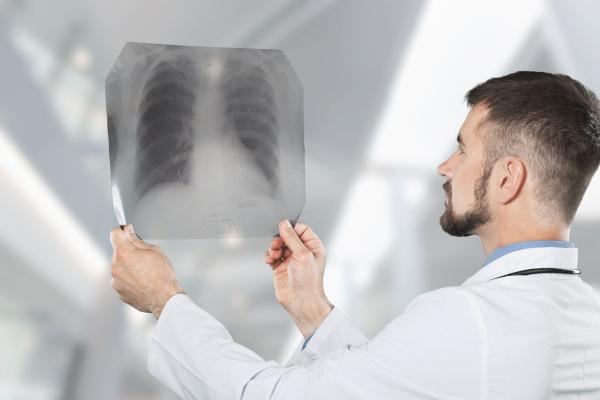THE cystic fibrosis, also called mucoviscidosis or salt kiss disease, It is a disease genetics that affects different body organs, like lung and pancreas. It is more frequent in populations of Caucasian descent, however, it can occur in all ethnic groups.
The disease is lethal, however, in recent years, there has been an increase in life expectancy of these patients, which is directly related to advances in the diagnosis and treatment of disease. According to the Ministry of Health, the disease "affects about 70,000 people worldwide, and is the most common serious genetic disease in childhood."
Read more: Genetic counseling - allows you to know the probability of a disease occurring in a family
What is Cystic Fibrosis?
Cystic fibrosis is a autosomal recessive disease in which one observes a dysfunction in gene CFTR, located in chromosome 7, which is responsible for encoding a protein chlorine transmembrane conductance regulator. The genetic defect present in this gene results in an absence or dysfunction of the CFTR protein, which causes the body to produce
thicker mucus than normal. The disease affects several organs of the body, including: lung, pancreas and other organs of the digestive system.
As it is an autosomal recessive disease, for the individual to have it, it is essential that he inherit one gene that causes fibrosis from his mother and one from his father. Therefore, it is not possible to contract the disease, the individual will already be born with it.
Do not stop now... There's more after the advertising ;)
Cystic Fibrosis Symptoms
Cystic fibrosis causes the individual to produce thicker mucus, which can be from 30 to 60 times thicker than usual. The presence of this mucus causes more microorganisms to accumulate in the airways, causing damage to the lungs. In addition, it can block normal transit in the digestive tract and pancreas, causing enzymes digestives do not reach the intestine. Without these enzymes, digestion does not take place properly and many nutrients they cannot be used.
It is noteworthy that, as cystic fibrosis is multisystemic, that is, it affects different organs, the clinical manifestations are also variable. Mucus in the lungs can cause, for example, persistent cough, frequent lung infections, shortness of breath and wheezing.
When it affects the digestive system, cystic fibrosis can cause problems like diarrhea, low growth and little weight gain. Another important symptom is the secretion of a sweat saltier than normal, this being the reason why the disease is called “the salty kiss disease”.
Cystic fibrosis too can affect the reproductive system.In women, there is a reduced fertility, but they can get pregnant. In the case of men, there is the production of sperm, but are infertile due to a condition known as azoospermia obstructive. In these men, an obstruction in the vas deferens prevents sperm from reaching the urethra.
Read too: Infertility - in most cases, it is reversed with proper treatment
Diagnosis of Cystic Fibrosis

Cystic fibrosis is a disease that, most of the time, is discovered soon after birth by the test known asfoot test.With the result suggestive for the disease, the individual will be submitted to the call sweat test,to confirm the diagnosis. there is also genetic tests that can identify the mutation in the CFTR gene.
Know more: Little eye test - fundamental for early diagnosis and treatment of vision-related diseases
Cystic Fibrosis Treatment
Cystic fibrosis is a disease that no cure, but the treatment can help the individual's quality of life. It must be done by a multidisciplinary team, so that the care is as comprehensive as possible and, thus, a better life expectancy for the patient can be achieved.
Among the professionals working in the treatment of cystic fibrosis are: pulmonologist, gastroenterologist, nutritionist, physiotherapist, nurse and psychologist. In children and teenagers, the team should also have pediatrician.
The treatment of cystic fibrosis has, among other objectives, the function of: ensuring the prevention and treatment of infections that affect the respiratory system and digestive; clean the airway; and promote adequate nutrition, ensuring that the individual receives, in the right amounts, all the nutrients they need for their growth and development.
By Vanessa Sardinha dos Santos
Biology teacher


